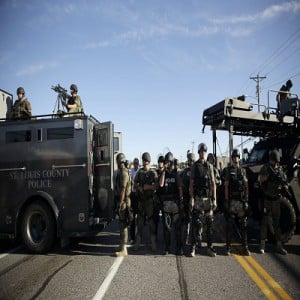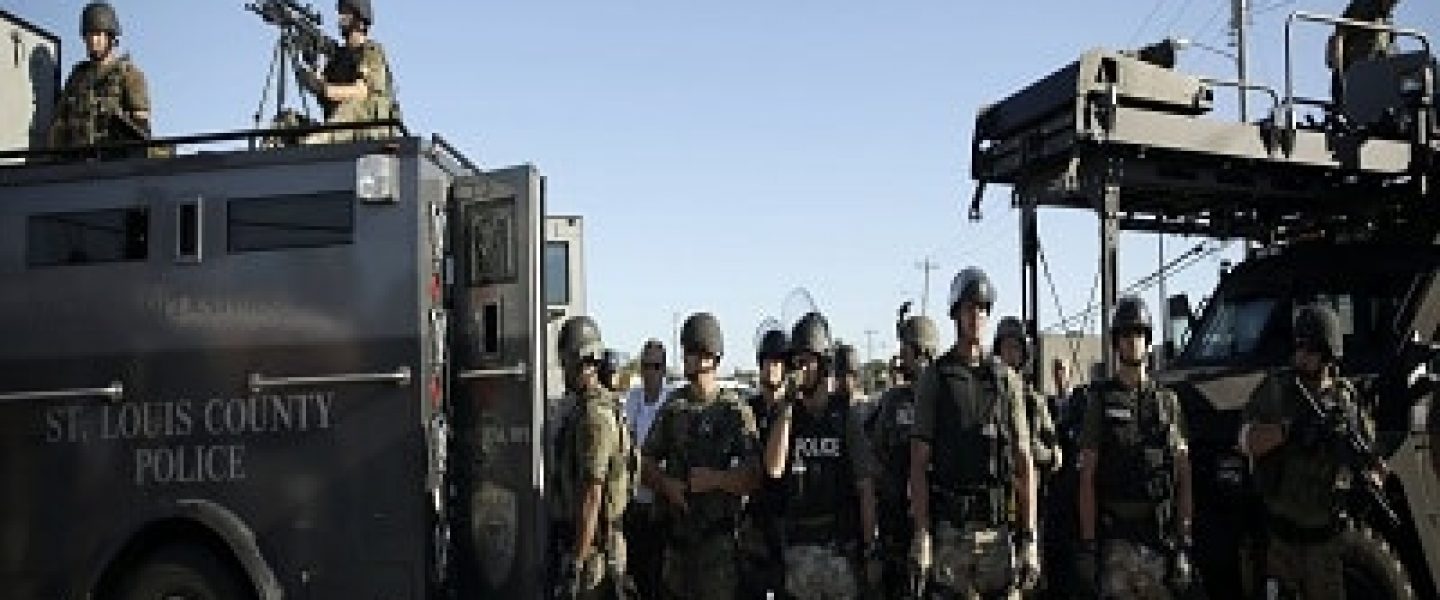
Yesterday, Reps. Hank Johnson (D-GA) and Raul Labrador (R-ID) introduced legislation to reform the Pentagon program, which transfers military equipment to law enforcement. The program has come under increased scrutiny from lawmakers after images from Ferguson, Missouri, showed law enforcement dressed like combat soldiers, using military equipment to deal with protesters. The Pentagon program has its roots in the drug war, coming to fruition in the early 90s as the U.S. government militarized its approach to drug policy. Just last week, Senators held a hearing on the issue of militarization in our law enforcement, where they critical of the Pentagon program.
Johnson and Labrador’s bill, the Stop Militarizing Law Enforcement Act has already received support from numerous legislators on both sides of the aisle. This rare bipartisan moment is a recognition that the increased militarization of law enforcement has to stop.
“In light of what we all saw in Ferguson, Missouri, the American people are clamoring for law enforcement to become less militarized. Grenades, drones, and tanks may belong on the battlefield; they certainly don’t have a place on U.S. streets,” said Michael Collins, Policy Manager at Drug Policy Alliance’s Office of National Affairs. “Such militarization is inextricably linked to the drug war, where swat teams and no-knock raids have become a routine part of drug arrests, even in the case of nonviolent offenders.”
The bill tackles the militarization of law enforcement in the following ways:
- Inclusion of better oversight and management of the Pentagon’s 1033 program, which allows the free transfer of certain military equipment to law enforcement
- Removal of any reference to counterdrug operations from the program, thus ensuring that law enforcement is not incentivized to use the equipment to perform arrests of those suspected of being low-level, non-violent drug offenders
- Lists equipment that is not suitable for law enforcement use, such as: drones, grenades, and mine-resistant tanks.
The huge problem of police militarization has received increased attention because of the events in Ferguson, but many have been sounding the alarm for years. Journalist Radley Balko has noted the nexus between the drug war and police militarization in his writing, while the ACLU’s June 2014 report on this issue noted that from 2011-2012, 62% of swat teams were deployed for for drug searches.
“This legislation is a thoughtful attempt at tackling a very worrying problem – the militarization of law enforcement,” Collins continued. “The Pentagon program is highly problematic because preferential treatment is given to those police forces that use their equipment to fight the drug war. This bill would end that, and move us away from a heavy-handed approach to drug policy,” stated Collins.
Source: Drug Policy Alliance – make a donation
Also from Law Enforcement Against Prohibition:
Yesterday House Representatives Hank Johnson (D-GA) and Raul Labrador (R-ID) introduced the Stop Militarizing Law Enforcement Act to reform Program 1033, which provides military equipment to local law enforcement. The bill would increase oversight, decrease the use of the program’s use in counterdrug operations, and ban certain types of equipment from being distributed to local police forces. As evidenced by a recent ACLU report, the majority of SWAT raids in which this equipment are now used for drug searches.
“Very occasionally and with proper oversight and training, the use of some military equipment is appropriate—school shootings, terrorist situations and the like,” said Major Neill Franklin (Ret.), executive director of Law Enforcement Against Prohibition. “But when it’s routinely used against nonviolent drug offenders, it only serves to further strain police-community relations so vital to preventing and solving violent crime. This bill will correct some of the worst excesses of a potentially useful program hijacked by the war on drugs.”
The Senate Committee on Homeland Security and Governmental Affairs held a hearing on the same subject last week after the death of black teenager Michael Brown in Ferguson, Missouri triggered protests that inspired a police response that briefly shone a global spotlight on the issue. LEAP advisory board member and retired Seattle police chief Norm Stamper was invited to contribute written testimony to those hearings.
“How a law enforcement agency is organized—not just the work it does on the streets—gives rise to and shapes an imposing workplace culture…” Stamper wrote. “Given the federal government’s generosity in distributing military equipment… we have seen even tiny, rural police departments transformed into small armies, their peace officers converted into soldiers… It is no wonder that so many Americans believe their local cops have become an occupying force, military in appearance, military in demeanor, military in tactics.”
Law Enforcement Against Prohibition is a group of law enforcement officers opposed to the war on drugs.


























